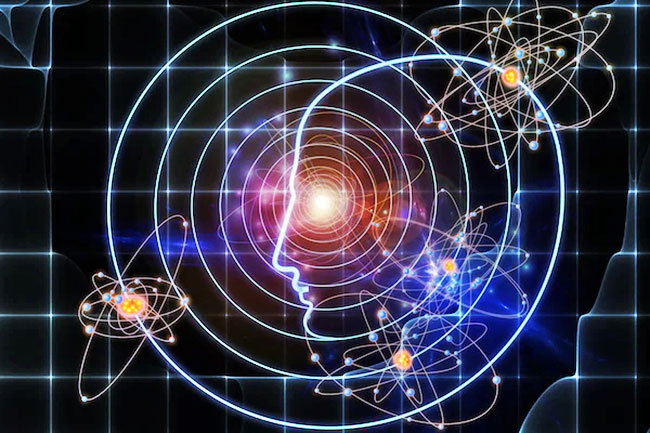|
by Bernardo Kastrup has some surprising implications...
Only the mathematical apparatus used to describe the behavior of matter is supposedly real, not matter itself.
For Tegmark, the universe is a,
He attributes existence solely to descriptions, while incongruously denying the very thing that is described in the first place.
Matter is done away with
and only information itself is taken to be ultimately real.
The motivation for this
association is not hard to fathom.
Yet, as our understanding of physics progressed, we've realized that atoms themselves can be further divided into smaller bits, and those into yet smaller ones, and so on, until what is left lacks shape and solidity altogether.
At the bottom of the
chain of physical reduction there are only elusive, phantasmal
entities we label as "energy" and "fields" - abstract conceptual
tools for describing nature, which themselves seem to lack any real,
concrete essence.
From their point of view,
such a counterintuitive conclusion is an implication of theory, not
a conspicuously narcissistic and self-defeating proposition.
Even
mind - psyche, soul - is supposedly
a derivative phenomenon of purely abstract information manipulation.
But in such a case, what exactly is meant by the word "information,"
since there is no physical or mental substrate to ground it?
By way of analogy, it is
possible to write - as Lewis Carroll did - that the
Cheshire Cat's grin remains after the cat disappears, but it is
another thing entirely to conceive explicitly and coherently of what
this means.
As such, information is a
property of an underlying substrate associated with the substrate's
possible configurations - not an entity unto itself.
It is a grammatically valid statement devoid of sense:
One assumes that serious proponents of information realism are well aware of this line of criticism.
A passage by Luciano Floridi may provide a clue.
In a section titled "The Nature of Information," he states:
Such obscure ambiguity lends information realism a conceptual fluidity that makes it unfalsifiable.
After all, if the choice of primitive is given by "an elusive concept," how can one definitely establish that it is wrong?
In admitting the possibility that information may be,
Whereas vagueness may be defensible in regard to natural entities conceivably beyond the human ability to apprehend, it is difficult to justify when it comes to a human concept, such as information.
We invented the concept, so we either specify clearly what we mean by it or our conceptualization remains too vague to be meaningful. In the latter case, there is literally no sense in attributing primary existence to information.
The untenability of information realism, however, does not erase the problem that motivated it to begin with: the realization that, at bottom, what we call "matter" becomes pure abstraction, a phantasm.
To make sense of this conundrum, we don't need the word games of information realism.
Instead, we must stick to what is most immediately present to us: solidity and concreteness are qualities of our experience. The world measured, modeled and ultimately predicted by physics is the world of perceptions, a category of mentation.
The phantasms and abstractions reside merely in our descriptions of the behavior of that world, not in the world itself.
Where we get lost and confused is in imagining that what we are describing is a non-mental reality underlying our perceptions, as opposed to the perceptions themselves.
We then try to find the solidity and concreteness of the perceived world in that postulated underlying reality. However, a non-mental world is inevitably abstract.
And since solidity and concreteness are felt qualities of experience - what else? - we cannot find them there.
The problem we face is thus merely an artifact of thought, something we conjure up out of thin air because of our theoretical habits and prejudices.
Tegmark is correct in considering matter, defined as something outside and independent of mind,
But the implication of this fine and indeed brave conclusion is that the universe is a mental construct displayed on the screen of perception.
Tegmark's "mathematical universe" is inherently a mental one, for where does mathematics - numbers, sets, equations - exist if not in mentation?
As I elaborate extensively in my new book, The Idea of the World, none of this implies solipsism.
The mental universe exists in mind but not in your personal mind alone...
This mental universe is what physics is leading us to, not the hand-waving word games of information realism...
|


